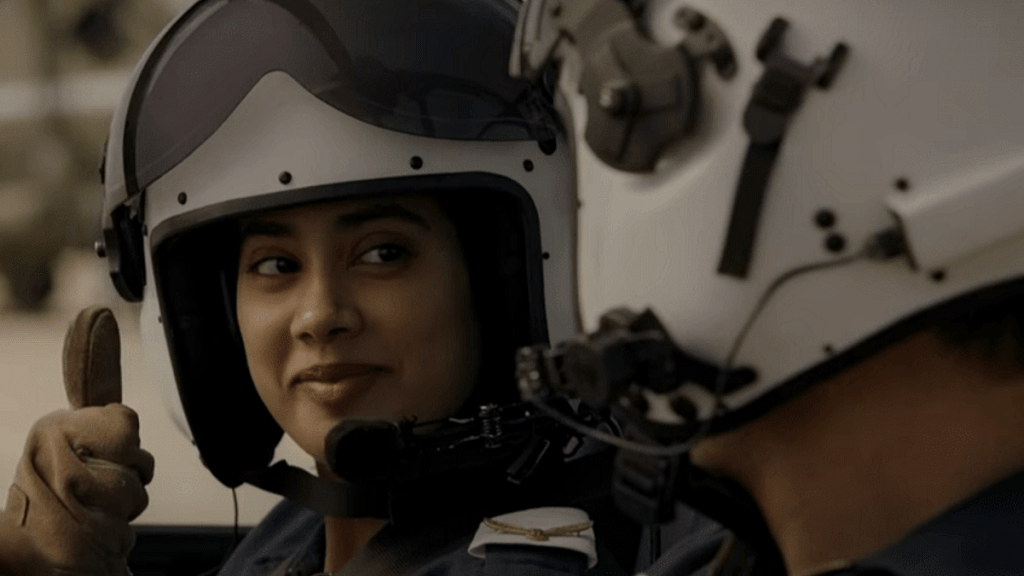New Delhi: The Indian film industry has made many films about Kargil but those have been fictional. The Jhanvi Kapoor starrer and Sharan Sharma directorial — Gunjan Saxena: The Kargil Girl on Netflix — features something that is close to real life or close to real incidents.
It also mentions the name of a person involved in those incidents. In such cases, there have to be some limitations to how much liberty one can take with the facts, ThePrint’s Editor-in-Chief Shekhar Gupta said in episode 550 of #CutTheClutter.
The movie trivialised the Indian Air Force, and it’s not so much the gender politics of the film, he said, adding that it is simply bad movie-making and shows very low IQ. It’s subtitle should be — you must never join the armed forces if you are a woman, Gupta said.
The first batch of flying women candidates was recruited in 1994. So it’s not as if somebody was the first in 1999 — which is when Kargil took place — as a lot of women were already flying for the Indian Air Force.
Moreover, the recruitment process in the film is made to look arbitrary and crude, Gupta said. Those interviews now are not taken by two officers and there’s always a psychologist, when final selections are to be made. Unlike what has been shown in the movie, medical examinations do not take place the same day and while one may have gotten selected at the end of a trial, one is not told so because similar trials are held with groups all over the country.
The film’s gender politics, where Kapoor’s character is shown to have been treated unequally with sorties getting cancelled, no toilets for women and many others, are far from reality, Gupta said, adding that the fictional representation of the brother-sister relationship in the film is also an insult to the viewers’ intelligence.
Pointing out that Cheetah helicopters were not involved in combat, none of them were shot down during Kargil, and no pilots were taken hostage, he said the film it’s also unfair and unkind to those who actually suffered casualties and those who actually exposed themselves to danger in combat.
Very few films based on military issues remain true to fact, and the Air Force complaining about it is justifiable, Gupta said. He also mentioned how the folklore has extended to the point where many known publications have reported that Saxena has won a Shaurya Chakra, which she has not.
The Vicky Kaushal starrer Uri: The Surgical Strike was also fictionalised, but because it suited the government and the armed forces, they adopted it, said Gupta. Similarly, he said, Sunny Deol’s Border was also fictionalised. “India hasn’t really made a great military history film, the closest we came was Haqeeqat (1964).”
A stirring speech in Nagaland
In the episode, Gupta also spoke about Nagaland Governor R.N. Ravi’s Independence Day addresses in which the latter used strong language. He said Ravi reminded Naga people that they have missed the peace dividend because of some vested interests. Some Naga insurgent leaders have been in Delhi, asking for the removal of the governor — who’s the chief negotiator interlocutor at the Centre’s behalf.
The problem is that these insurgent groups have not done much fighting in a very long time, for a couple of decades in fact, and they have acquired big vested interests and structures where they are now extorting in the name of what they call tax collection, said Gupta. Nagaland’s sovereignty, its own flag and constitution was never on the table and here the governor is right, he said.
Dhoni retires, Chauhan passes away
Moving onto cricket and M.S. Dhoni’s retirement, Gupta said how the former captain cool was the first genuine small town character who took over Indian cricket and gave everybody the belief that you could come into the national cricket team from small towns, and become rich and famous.
Dhoni was also someone completely divorced from the coaching manual, and brought in unconventional cricketers, he added.
While India has been doing well in Test matches, they have not won any ICC trophy since Dhoni retired. So the last ICC trophy India won is the Champions Cup in 2013.
Cricketer and UP minister Chetan Chauhan died due to Covid-related complications at Gurugram’s Medanta Hospital Sunday. Gupta recalled how the “very courageous cricketer” was the most successful opening partner with Sunil Gavaskar. He partnered Gavaskar in 59 innings. In those days, when not that many Test matches were played, Chauhan scored more than 3,000 runs while opening with Gavaskar. He, however, never scored a Test hundred.
Watch the latest episode of CTC here:
